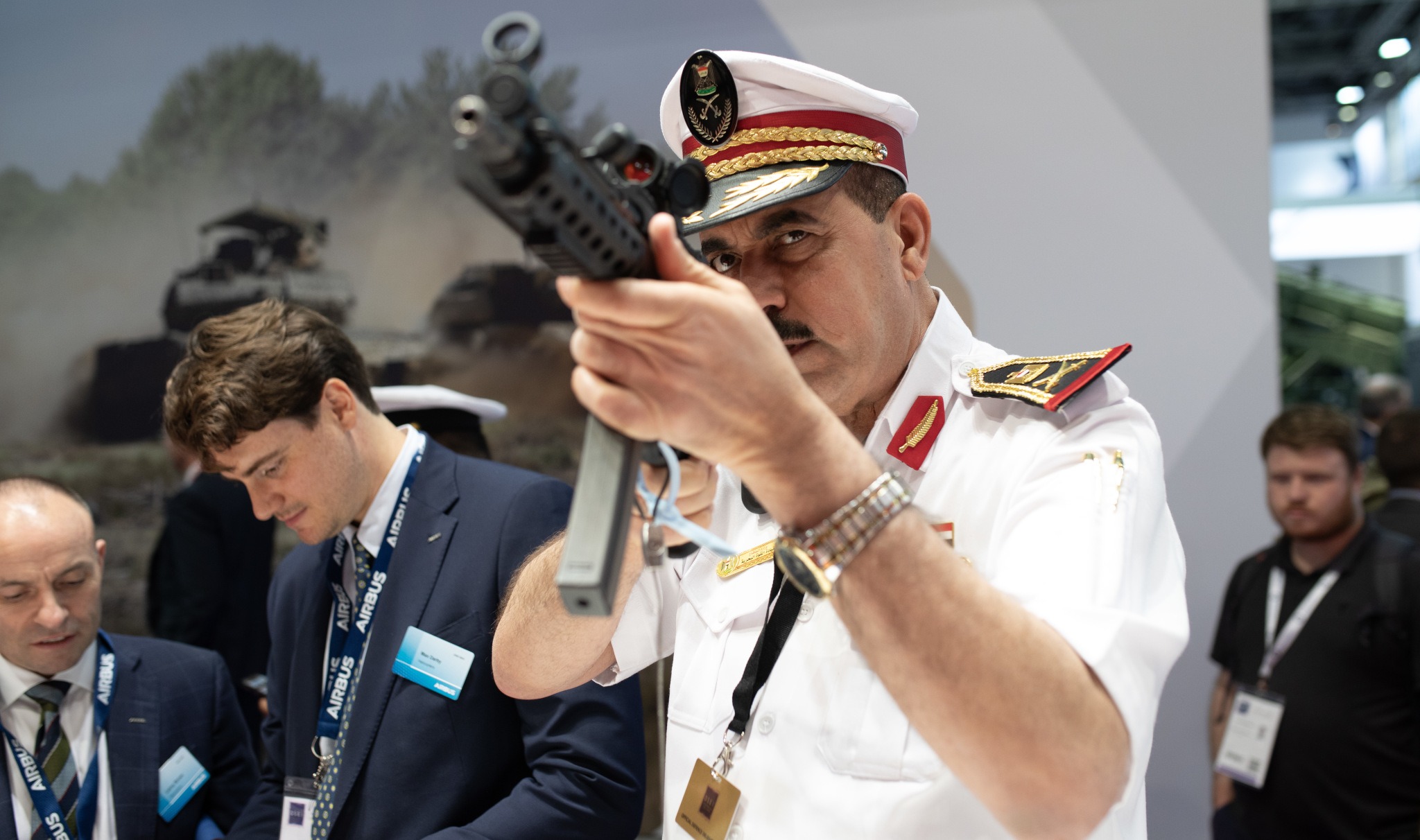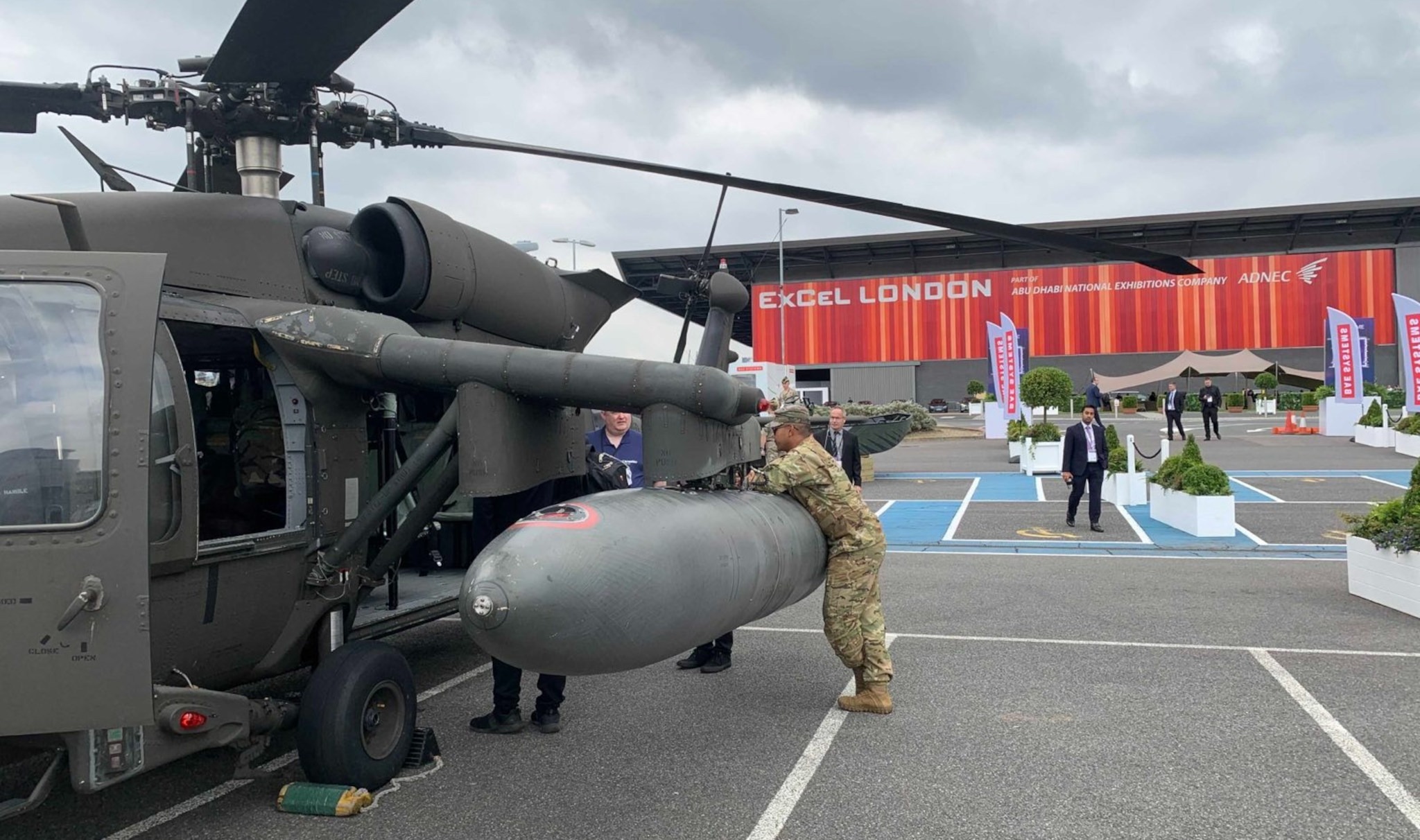“The war in Ukraine has driven an increase in sales across the portfolio for sure,” says Matthew Bragoni, a representative of Ensign-Bickford Aerospace and Defense (EBAD).
Bragoni, a US army veteran who served in Iraq and Afghanistan, is standing by his company’s stall in London at the Defence and Security Equipment International (DSEI). This biannual arms fair is the jewel in the crown of the global weapons industry.
“Everyone’s well aware that the US military has been donating [to Ukraine] a lot of product that was in stock,” he observes. “And so we’re seeing the second order effect where these purchases – as the US emptied out their inventory – they’re re-buying”.
EBAD is based in the US state of Connecticut. Bragoni is the director of their group which is focused on delivering products to “warfighters around the world”. These range from missile parts down to explosives for clearing minefields, which are now being sent to Ukraine – “something we’re very proud of”, Bragoni notes.
“We’ve sold and delivered over a thousand man portable line charges, which are backpack carried mine clearing charges,” he explains. “So if a soldier finds himself in a heavily mined area, he can deploy the system quickly, create a path to safety and get back to friendly territory without injury.”
While no gadget can stop thousands of Ukrainian soldiers losing limbs in Russian minefields, Bragoni believes the future looks bright for arms companies.
“It’s going to be more insecure going forward…the near term is very dangerous. I think we’re seeing it across the globe,” he says. “There’s a strong pivot back to entrenchment from a Cold War mentality. And we’re going to see a rebuild of inventory in stock.”
He pauses then adds: “I think that’s going to cause a ten year boom in manufacturing and EBAD will certainly be a beneficiary.”
On the ethics of London hosting the world’s largest arms fair, which mayor Sadiq Khan opposes but hasn’t stopped, Bragoni is stumped. “Britain has been at the core of Western security and global security for the last 200 years, and I think it’s natural that they host the world’s largest expo…I would hope a British citizen would be proud of that.”
‘Business is great’
Bragoni’s enthusiasm is shared by another American firm whose stand we find further inside the sprawling ExCel exhibition centre, after navigating past an AI-powered robotic dog.
“Business is great,” Trevor Schriver from Curtiss Wright confirms. “In spite of the last two or three years of economic downturn resulting from the Covid issues and so forth. But military spending is continuing to increase from my perspective. So business has been good.”
His division sells systems to help helicopters land on warships, even in the stormiest weather.
When Schriver learns we haven’t attended arms fairs in other countries, he is taken aback. “Only one you’ve ever been to? Then you’ve been spoiled! We attend shows on a global basis, and this is without question, a premiere show globally. There’s no question about it.”
He does show a little more concern about the protesters camped outside the ExCel. Campaign Against Arms Trade (CAAT) called the event a “marketplace in death and destruction”.
Schriver is diplomatic: “War is never a good thing. I think we can all agree on that fact. But we need to focus on the fact this is a defence show.”
He adds: “This isn’t a show to encourage aggression. It’s a show meant to deter your enemies by showing strength… And that’s exactly how it should be perceived. We’re naive to think that without defensive equipment that you’re going to be safe. Not everybody shares that perspective.”
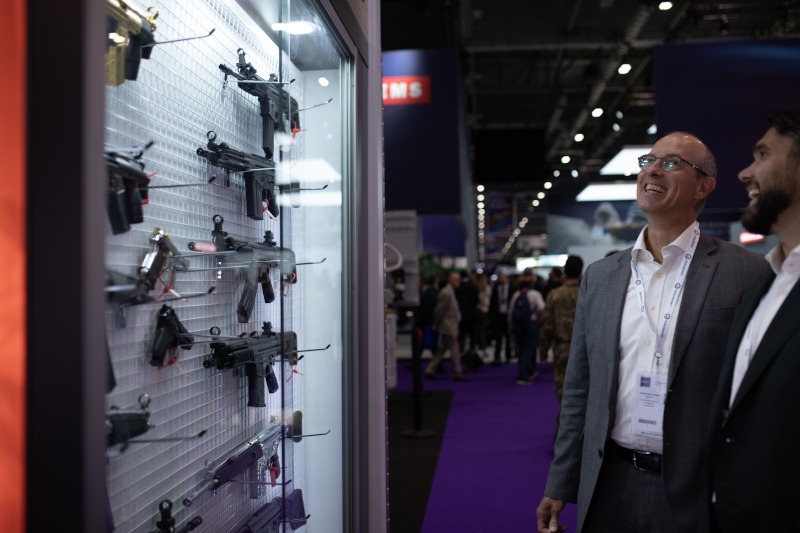
‘Very buoyant’
The mood at DSEI is in stark contrast to the subdued atmosphere we found at its last iteration two years ago. Held in September 2021, weeks after the fall of Kabul, the technological prowess of the West’s arms industry had been humbled by the Taliban’s “country boys”, as the head of the UK military, General Nick Carter called them.
This time the event is taking place amid $50bn of arms shipments to Ukraine, a long-awaited chance to test NATO equipment against its Soviet-era equivalent. And even if Ukraine’s grinding counter-offensive does not achieve a breakthrough this year, with nearly half a million casualties from the conflict, the increase in arms sales will be long lasting.
“The war in Ukraine is a factor for the increased activity levels within this market”
“The business environment is very buoyant, very active,” says Steve Blackwell, the sales manager for APEM, the world’s largest manufacturer of switches, joysticks and LCDs, which are mostly used in military vehicles.
“The war in Ukraine is a factor for the increased activity levels within this market,” he states. “We’re seeing new projects launched, but also legacy products that were designed in the 1990s, the noughties, are also being rekindled and new developments are taking place”.
NATO members are also finally trying to meet their commitment to spend 2% of GDP on defence, Blackwell notes approvingly. “So we’re seeing a very broad and a very deep requirement for all of our military products.”
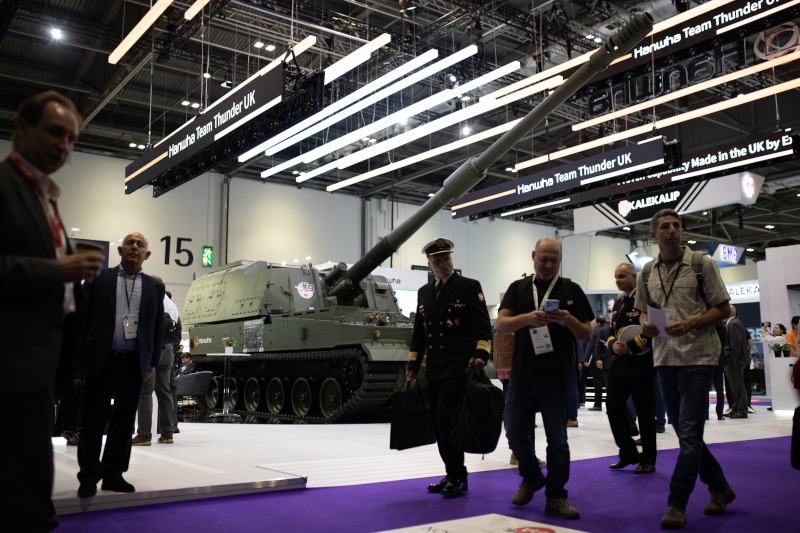
The proof is visible to anyone at DSEI. “It seems to be very, very active,” he smiles. “Very, very busy. The footfall is amazing.”
Even for firms as far away from the Ukraine conflict as South America, business is on the rise. Componentes & Sistemas de Defesa (CSD) is a Brazilian arms firm with close links to its authorities. Their salesman Paulo Kleinke says they make “ammunition, rockets, and bombs”.
Business is “very good at the moment, actually, because of the conflicts all over the world,” Kleinke freely admits. “Most of the countries are now replacing ammunition that they have given to Ukraine and maybe sometimes Russia. But yes, for us it is a good period.”
‘Very cool’
No one we meet at DSEI is more cheerful than Tony Gaunt, who jokes that his diminutive stature is due to testing his company’s “very cool” ejector seat. Gaunt represents Martin Baker, a British family business that makes this highly specialised product for many of the world’s military aircraft.
He says business is booming. “Even through COVID, we didn’t suffer any loss in business at all. We were very, very busy all the way through and we have a very good order book.” Customers need deep pockets. Their older seats sell for between £150,000 and £300,000.
At Martin Baker, “our biggest customer is the US, without a shadow of a doubt,” Gaunt says. Yet it does have some more controversial ‘end-users’.
Many of its ejector seats are fitted in the Tornado and Typhoon fighter jets that Saudi Arabia’s air force has used to bombard Yemen since 2015, creating the world’s worst humanitarian crisis with surgical strikes on food supplies and medical facilities.
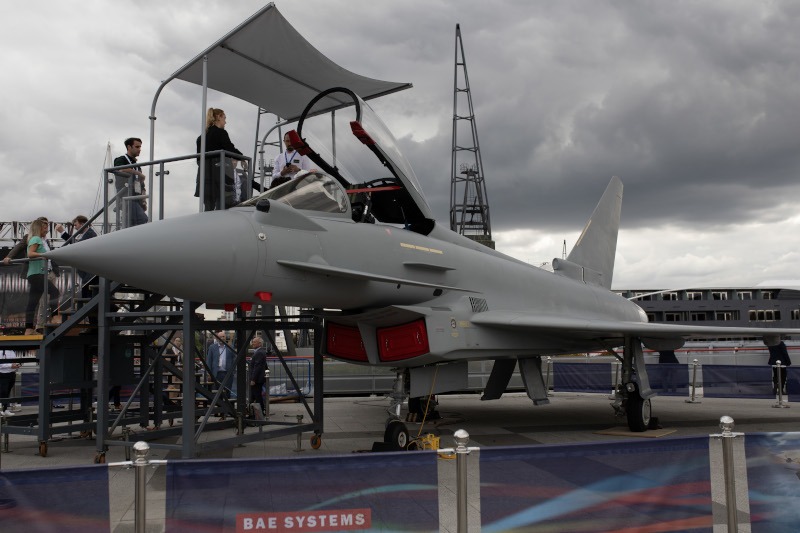
Gaunt is proud that two Saudi Tornado pilots recently made a safe ejection from the company’s seats, but tries to put some distance between Martin Baker and the final user. “We sell to BAE Systems who provide it [to Saudi]. So they then determine the end user.”
BAE Systems is Britain’s largest arms company, and has profited more than almost anyone else from the war in Yemen, selling £18bn to Riyadh during the conflict. Their pavilion at DSEI, which flows with red wine, is so vast they arrived an extra week earlier than everyone else to set up. One of their Typhoons is parked outside the entrance to ExCel.
From Yemen to Ukraine
BAE suffered severe pressure during the Yemen war, with CAAT repeatedly taking them to court over their Saudi sales. Brigadier John Deverell, a former British defence attaché to Saudi Arabia and Yemen, even compared BAE’s business to the slave trade.
In 2020, after airstrikes killed Yemeni children, he told us: “If I were a board member or a major shareholder in BAE Systems, I’d be asking what is being done to diversify away from reliance on Saudi revenue? This is not reputationally sustainable.”
Fortunately for BAE, world events have allowed them to remake their image. The war in Yemen has abated after an unexpected Chinese-brokered ceasefire. And closer to home, Russia’s invasion of Ukraine has seen BAE sell weapons to counter Vladimir Putin’s war crimes (many of which mirror what Saudi jets did in Yemen).
Their M777 155mm Howitzer, a vast artillery gun, dominates the other entrance to ExCel. It’s used mostly by the US marine corps, which shipped at least 90 to Ukraine. Business with Kyiv is booming so much that BAE is now opening an office in the country. Their share price has doubled since last year.
One of their most well-known products, the Challenger 2 tank, is not on display at DSEI, despite Rishi Sunak donating 14 to Kyiv from British army stocks. It has attracted some controversy for being equipped with depleted uranium (DU) ammunition, which Iraqi doctors blame for causing birth defects and cancer after the US and UK fired it in both Gulf Wars.
Wandering around their stand, we find an interesting looking shell. It’s the XM1155 Scalpel, which has double the range of current precision guided munitions. A BAE salesman is proud of their creation, but is coy about some details. “It’s not made from DU, but I can’t say what metal it does use.”
A burning question
The company has extremely close ties with the British government, which has invited high-level delegations from Saudi Arabia to attend DSEI. So when we see armed forces minister James Heappey strolling through the ExCel centre, a burning question arises.
“Why does the UK sell so many weapons to dictatorships like Saudi Arabia? How do you justify that?”, we ask him. He responds by suggesting we arrange an interview through his department’s press office, who would almost certainly stonewall us.
“You’re the democratically elected minister,” we push back. “Are you aware that Saudi Arabia has sentenced someone to death for a tweet? How do you feel about selling weapons to a regime that does that?”
Heappey walks on, ignoring our question. Yet DSEI’s official spokesman, retired British army general Roddy Porter, is more accommodating. “Whether regimes are bad or not is a matter of perspective, and a matter of where you stand on a particular argument,” he reasons, dabbling in moral relativism.
“But essentially the delegations are invited by the British government and we have no say in how that happens. That’s the law.” Although Porter seems relaxed about rubbing shoulders with a regime that dismembered a journalist, he is more committed to press freedoms in the UK.
“Are you aware that Saudi Arabia has sentenced someone to death for a tweet?”
“In previous years, you may not have got accredited to come to the exhibition,” he confesses. “We took a different line about two or three DSEIs ago. In that credible journalists, irrespective of their editorial line, ought to be enabled to come into the exhibition.”
It’s the third time we’ve interviewed Porter at DSEI, and the discussions are increasingly profound. He rejects President Eisenhower’s famous warning that the military industrial complex would spark wars as “too cynical”. Having served in Northern Ireland, the first Gulf War and three tours of Bosnia, he has a particular view of human nature that for him justifies the international arms trade.
“I was a soldier for 31 years. I’ve seen people die. My friends have died, and I’ve been in the vicinity of some pretty horrible events. I think much of what I’ve seen has driven me to the conclusion that defence is important for the nation and defence is important for our allies and our friends, because some of the evil I’ve seen, I wouldn’t want to go any further than it’s gone.”
For him, DSEI promotes the bombs and the bullets needed for “pushing back on wickedness”. Porter posits: “It’s regrettable, but it’s a necessity given the nature of our fallen world and the nature of the human heart”. Ukraine’s leaders may agree with Porter. Those who were on the receiving end of BAE’s missiles in Yemen almost certainly would not.

